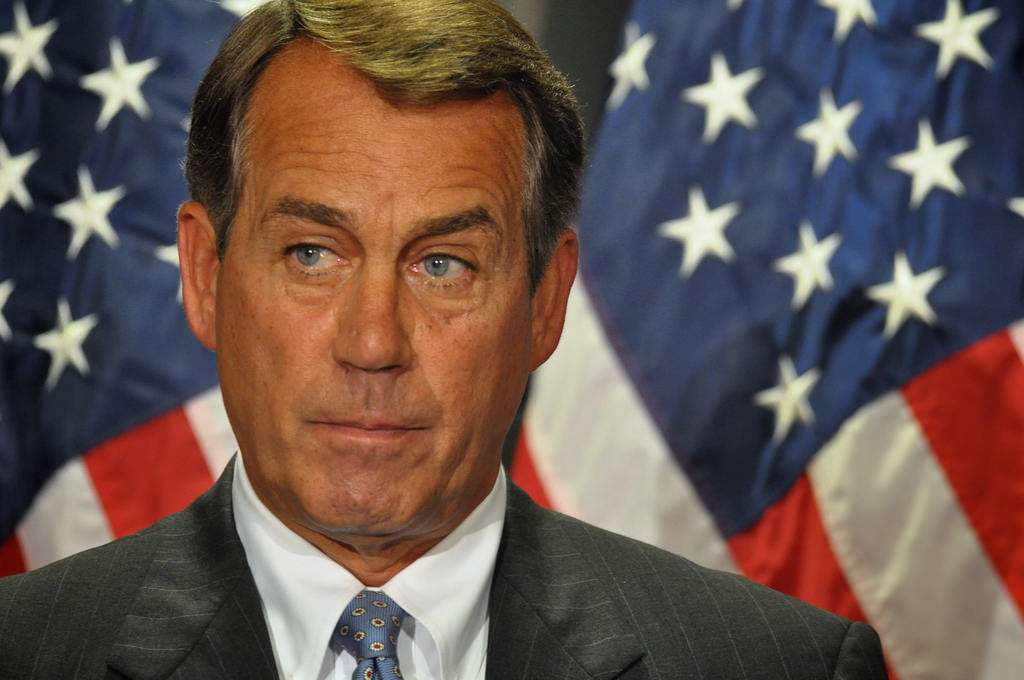John Boehner's Missing Agenda
The outgoing Speaker of the House leaves a Republican party that's fractured and directionless.

At the end of the month, John Boehner will retire from Congress, leaving the role of Speaker of the House to someone else, yet to be determined. Boehner has held his role for five years, and has become a fixture of the Obama era—arguably the most prominent and influential Republican of the decade so far. While others (notably Mitt Romney) have occasionally stepped into the spotlight, it is Boehner has served as the party's most consistent leader, its institutional voice and guiding hand.
Yet during his tenure, Boehner has accomplished very little—not merely in terms of practical legislative accomplishments, which would have been difficult at best, given the power of Democrats in the Senate and President Obama's veto pen in the White House, but in terms of shaping and defining the party he led, and readying it for the future.
Boehner ascended to Speaker at the beginning of 2011 as the GOP regained the House majority it had lost during the George W. Bush administration four years earlier. Despite its gains, the party was a mess—a troubled, directionless political organization that had grown increasingly unpopular during the Bush years, and frequently found itself riven with internal disagreements.
Yet as Boehner steps down, he leaves a party that is in many ways even more fractured than it was when he became Speaker.
Boehner offered his resignation in part as a sacrifice move in order to prevent a contentious government shutdown at the beginning of October, but all he really succeeded in doing was postponing the next shutdown fight until the middle of December, when the next Speaker will be in place. He also leaves behind a related showdown over an increase in the federal debt limit at the beginning of November.
The party has no obvious leader in waiting. Boehner's most likely successor, Majority Leader Kevin McCarthy, is an affable tactician. But he's already managed a significant blunder by openly admitting that the GOP's Benghazi investigation was a political maneuver designed to degrade Hillary Clinton's poll numbers, which resulted in Hillary Clinton's first big campaign ad. And he's inspired an aggressive challenger in Rep. Jason Chaffetz, who has suggested that he might escalate several coming congressional showdowns.
The situation is no less turbulent outside of Congress, where the GOP is even less well-liked than when Boehner became Speaker, and Donald Trump and Ben Carson, two outsiders with no political experience, are leading the party's presidential primary.
Whatever your opinion of Boehner, or the upcoming battles in Congress, it's clear that he has not been a unifying force. He leaves a party with no direction or shared self-understanding. And at least part of the reason is that, practically speaking, Boehner offered no agenda for the party to follow.
Think about it for a moment: What, exactly, did John Boehner stand for as Speaker? What vision did he offer for the nation? What strategy did he put forth to achieve his party's goals? What, for that matter, were his party's goals?
Boehner's speakership was characterized by a desire to avoid escalating showdowns with the executive branch when possible, and he deserves some credit for this. But this desire was motivated almost entirely by short and medium-term political fears rather than any identifiable larger purpose. He was chiefly concerned with the GOP's popularity and electability, and in the end, as the party's sinking approval numbers suggest, he struggled to protect even that.
It is often said that Boehner is an institutionalist. That's not wrong, exactly, but it gives Boehner too much credit. By focusing narrowly on protecting the party's political image, he failed to take steps necessary to rebuild—or at least start rebuilding—an obviously broken institution. Boehner never pushed the GOP to grapple with the practical realities of legislative politics, never demanded that his party engage with the often-frustrating specifics of public policy, and, perhaps most importantly, never created an outlet for the party to truly reckon with the various political and policy failures of the Bush era, and all of the damage those failures did to the Republican party.
Following this path would have been difficult, and, given the structural realities of America's political system, would likely have resulted in few if any additional serious legislative victories. But these are the sorts of projects that would have been necessary to prepare the GOP to succeed, if not during the Obama administration, then in the years that follow. Ultimately, that's Boehner's biggest failure: He's left behind a party that has no more direction, no more self-awareness, no more sense of purpose, than it had five years ago.
This is not exclusively Boehner's fault, of course. The Republican party of the last five years would have been a tough beast for any Speaker to tame. It may simply be that the GOP of 2015 is a party that cannot be led. But Boehner can hardly be said to have tried.


Show Comments (78)